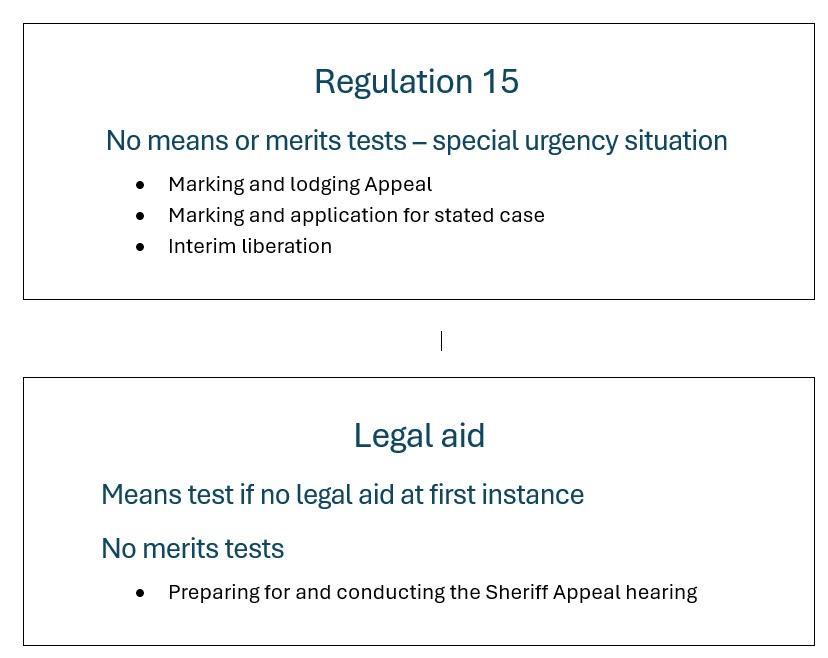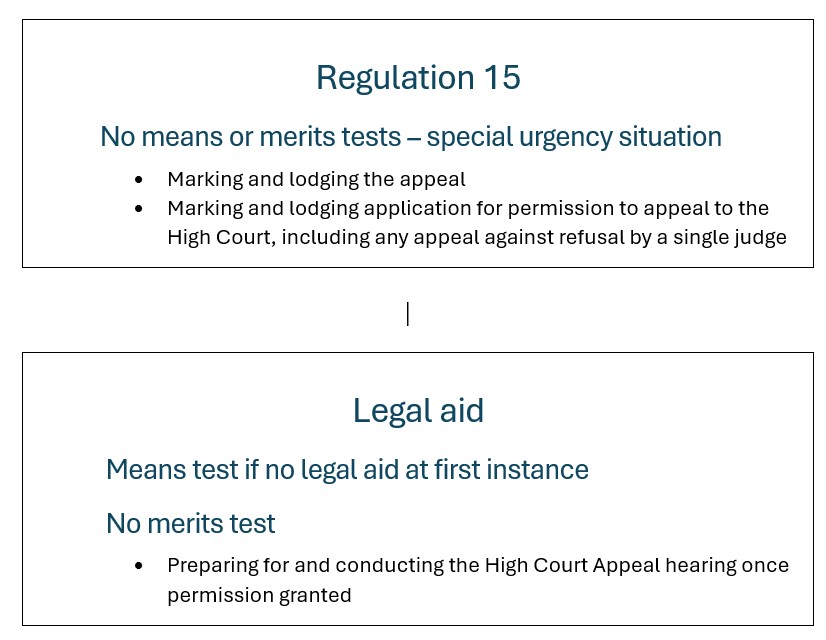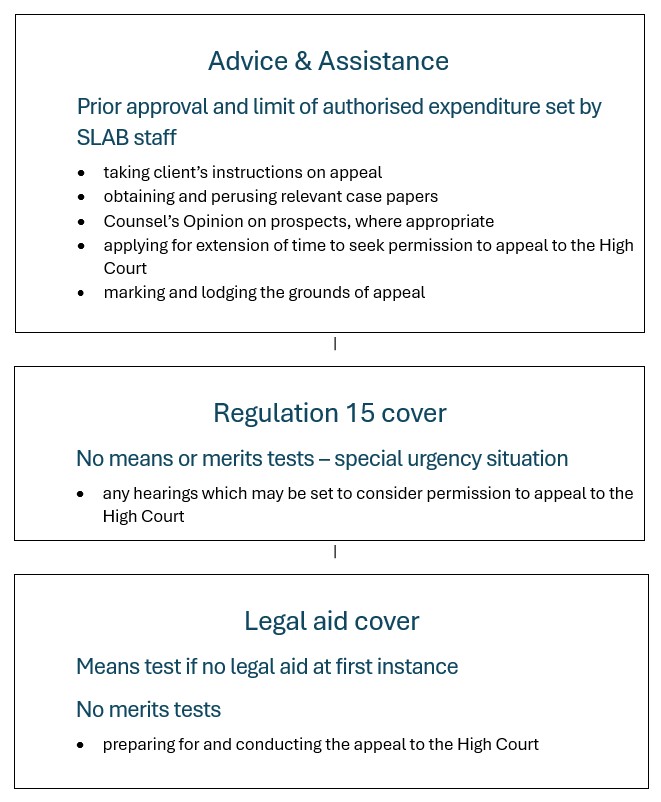
https://www.slab.org.uk/guidance/criminal-legal-assistance-procedures-for-the-sheriff-appeal-court/
https://www.slab.org.uk/guidance/criminal-legal-assistance-procedures-for-the-sheriff-appeal-court/
From 22 September 2015, all appeals against conviction, sentence, other disposal or acquittal in summary procedure cases are being heard by the Sheriff Appeal Court.
The existing appeals procedures, and the requirement for leave to appeal will remain the same as before, except that leave to appeal will be considered by Appeal Sheriffs instead of High Court judges.
Appeals on a point of law may be taken to the High Court against any decision of the Sheriff Appeal Court in criminal proceedings, but only with the permission of the High Court. The High Court may give permission for an appeal if it considers that:
In considering such an appeal, the High Court may:
The legal aid procedures required for the new Sheriff Appeal Court are as follows:
Sheriff Appeal court cases will initially follow the same route as all current summary criminal appeals.
Emergency cover under Regulation 15 will be provided until leave to appeal has been granted, either at first instance by the single Appeal Sheriff, or after review by the Sheriff Appeal Court.
Thereafter, an application for an appeal certificate should be lodged at the conclusion of the sift process, with necessary supporting documentation confirming that leave to appeal has been granted.
Section 175 A of the Criminal Procedure (Scotland) Act 1995 gives the power to the Sheriff Appeal Court to refer a point of law to the High Court for its opinion, if it considers that the point is a complex or novel one.
The Sheriff Appeal Court may make a reference in this way, either on the application of a party to the appeal proceedings, or on its own initiative. Either way, on giving its opinion on a reference, the High Court may also give a direction as to further procedure in, or disposal of the appeal.
The procedures which are required for such references are not distinct proceedings for the purposes of criminal legal aid.
Therefore, any work required by the appellant’s representatives will be covered by the grant of legal aid already made for the Sheriff Appeal Court appeal.
Section 194ZB of the Criminal Procedure (Scotland) Act 1995 sets out the provisions for appeals on a point of law which can be taken to the High Court against any decision of the Sheriff Appeal Court in criminal proceedings, but only with the permission of the High Court.
The appeal can be taken by any party to the appeal in the Sheriff Appeal Court.
The High Court may give permission for an appeal if it considers that the appeal would raise an important point of principal or practice, or:
This will be a high test to satisfy, and confirms that the High Court cannot simply be used as a further court of appeal.
An application for permission to appeal must be made within 14 days of the date of the decision of the Sheriff Appeal Court that is to be the subject of the appeal.
The High Court can extend this period if it is satisfied that doing so is justified by exceptional circumstances.
This application for permission to appeal to the High Court will be considered by a single judge in chambers without the parties present.
If the judge gives permission for the appeal, the judge may make written comments in relation to the appeal.
If the judge refuses permission, he/she must give reasons in writing for the refusal, and where the appellant is on bail, the judge must also grant a warrant to apprehend and imprison the appellant.
Where the single judge refuses permission to appeal to the High Court, the appellant may apply again for permission to appeal within 14 days of the date when the decision to refuse permission was made.
The High Court may extend this period if it is satisfied that doing so is justified by exceptional circumstances.
Three High Court judges will then consider the application for permission to appeal to the High Court, again, in chambers without the parties present.
If the High Court gives permission to appeal, the Court may make comments in writing in relation to the appeal.
If the High Court refuses permission to appeal, the Court must give reasons in writing for the refusal, and where the appellant is on bail, the Court must also grant a warrant to apprehend and imprison the appellant.
The High Court appeals under section 194ZB of the 1995 Act against a decision of the Sheriff Appeal Court are distinct proceedings for the purpose of criminal legal aid, so separate criminal legal aid arrangements are needed as follows.
Regulation 15 cover will be used for the application for permission to appeal to the High Court under section 194 ZC of the 1995 Act.
This grant of regulation 15 cover will also include any applications for permission to appeal to the High Court, if this is initially refused by the single judge under section 194ZD of the 1995 Act.
If permission to appeal to the High Court is granted, either by the single judge or any subsequent bench of three judges under section 194 ZE of the 1995 Act, an application for full legal aid will then be required for the appeal to the High Court.
In disposing of an appeal under section 194ZB, the High Court has two options.
It may remit the case back to the Sheriff Appeal Court with its opinion and any direction as to further procedure in, or disposal of the case.
Alternatively, it may exercise any power that the Sheriff Appeal Court could have exercised in relation to disposal of the appeal proceedings before that court.
If the High Court remits the case back to the Sheriff Appeal Court, then any subsequent work required at the Sheriff Appeal Court should be covered by the initial grant of legal aid for the Sheriff Appeal Court appeal, and not the High Court appeal.
Again our guidance will make this clear, and we will also remind solicitors of this in the electronic notifications sent to them when granting legal aid for High Court appeals.
Any application for permission to appeal to the High Court needs to be made within 14 days from the date of the decision of the Sheriff Appeal Court which is the subject of the appeal.
If the application for permission is refused by the single judge, a second application to the High Court for permission to appeal needs to be made within 14 days of the single judge’s refusal.
In both situations, the High Court can extend this period if it is satisfied that doing so is justified by exceptional circumstances.
In terms of the legal aid processes for these late appeals, we consider that we should keep these consistent with the new procedures implemented in April 2015.
These procedures mean that Advice and Assistance cover should be used, and appropriate increases applied for, to cover the work required up to and including the consideration of the application for the extension of time to lodge the permission to appeal, and the consideration of the grounds of appeal.
The Act seems to indicate that both the single judge and the three judges will consider these applications in chambers, so Regulation 15 cover will not be required to cover any proceedings.
However, should it transpire that a hearing is set down for a single judge to consider this at first instance, or for the three judges to consider this later, then regulation 15 cover could be used for that.
Applications for full legal aid should not be made until the application for permission to appeal has been granted.
In the application for legal aid, we will seek confirmation and evidence that permission to appeal has been granted.
There is no change in the current procedures for any late appeals from the court of first instance to the Sheriff Appeal Court.
These late appeals will continue as at present, with an application for extension of time needing to be submitted along with the lodging of the grounds of appeal.
The legal aid procedures for late appeals which were revised earlier this year will still be appropriate for late Sheriff Appeal Court appeals, where Advice and Assistance is used for the initial instructions, and the lodging of the extension of time application and the grounds of appeal.
Section 194ZK (1) was added to the 1995 Act in relation to the finality of proceedings from the High Court. It states:
“Every interlocutor and sentence (including disposal or order) pronounced by the High Court in disposing of an appeal relating to summary proceedings is final and conclusive and not subject to review by any court whatsoever.”
While the intention of this section is quite clear, it remains to be seen if will be challenged itself.


